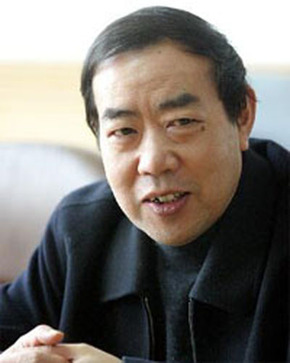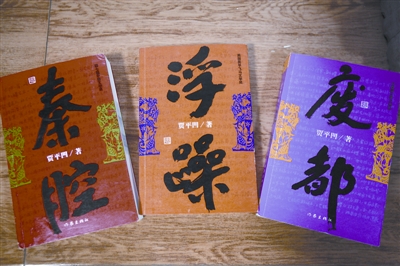| ?

|
|
Jia?Pingwa |
A novel's reprint is usually a non-event, especially in today's saturated book market. But the reprint of Jia Pingwa's Ruined Capital (Fei Du, also translated as Abandoned City) is a big deal as the book recently emerged from underground circulation for the first time in 16 years.
Reprinted by Writers Publishing House, Fei Du is being packaged together with Turbulence (Fu Zao) and Local Accent (Qin Qiang) as a trilogy. The publisher has been sending copies to book dealers across the country since July 28. A book launch is to be held on Saturday at the Jia Pingwa Literature and Art Museum in Xi'an, northwest China's Shaanxi province, with Jia in attendance to give out signed copies.
First published by Beijing Publishing House in 1993, the magnum opus of 400,000 characters became an instant hit amid a publicity blitzkrieg. The first 500,000 copies were snapped up immediately.
Its mixed reviews catapulted Fei Du into the center of a major controversy. Three months later, all the sound and fury aroused by the novel died down suddenly, following a ban by the authorities for the novel's "vulgar style and pornographic descriptions."
But Fei Du never really disappeared and the controversy surrounding it never ended. On the contrary, the ban became a catalyst for the novel's wild underground circulation. According to incomplete statistics, more than 1 million copies have been formally or semi-formally published and the number of pirated copies likely exceeds 12 million. Jia himself has reportedly collected more than 60 pirated versions.
Fei Du features the life of four intellectual idlers in "Xijing", the fictional name for Jia's long-time home of Xi'an. Labeled by some as the modern Plum in the Golden Vase (Jinpingmei, a Ming Dynasty erotica), Jia's reputation gained from a series of award-winning short stories and novellas in the 1970s and 1980s, was eclipsed. The previous "clean" writer was denounced as an "indecent rouge" overnight.
In a dialogue with literary critic Xie Youshun, Jia reflected on the impact of Fei Du on his personal life and his writing career. "I have twice known the ways of the world most profoundly. The first was when my father was falsely convicted as a counter-revolutionary, the second was when the controversy generated by Fei Du broke out."
For Jia, the furor over Fei Du was like adding insult to injury. Even as he started writing the novel, the author was grappling with several personal problems - the sudden death of Lu Yao, a long-time literary friend and rival, the end of his marriage, and the onset of a serious case of hepatitis.
 |
|
Reprinted? by Writers Publishing House, Fei Du (right) is packaged together?with Turbulence (Fu Zao) and Local Accent (Qin Qiang) as a trilogy. |
Despite the crushing pressures, Jia battled on. At his worst, he turned to literature as a curative. "The controversy triggered by Fei Du made me more tolerant," Jia said in an interview with Wenhui Daily, "and that is why I could write White Nights (Bai Ye), Earth Gate (Tu Men), Old Gao Village (Gaolaozhuang), Remembering Wolves (Huainianlang) and Local Accent (Qin Qiang)."
While Fei Du won the Prix Femina, a French literary award, in 1997, Qin Qiang earned him the seventh Mao Dun Literary Prize last year.
Concerning the reprint, Jin Shikai, publicity director of Writers Publishing House, refused to answer questions on whether the ban on the book had been officially lifted and also on the number of reprint copies.
Liu Fang, director of the chief editor's office, told China Daily: "The publishing house has only two points to make. First, Jia Pingwa is an outstanding writer. Second, the reprint of Fei Du follows the procedures and complies with the standards of authoritative requirements."
The reprint seems to be largely the same as the 1993 edition. The most obvious change is that the small blank squares, used to denote the deleted characters, have been replaced by the more commonplace rows of dots.
Lin Jinrong, editor in charge of the reprinted edition, said that Jia and the publishing house had jointly decided on the change.
"Why the change? Well, no special reasons. Rows of dots are simply not that conspicuous," Lin answered hesitantly and refused to say more.
Li Jingze, literary critic and editor-in-chief of the Beijing-based journal People's Literature, explained that blank squares were widely used in Ming and Qing erotic novels and indicated a taboo subject. The deliberate imitation of that rule in Fei Du actually made the taboo seem more obvious.
Chen Xiaoming, literary critic and professor with Peking University, said: "The reprint of Fei Du reflects China's increasing progress and tolerance. Literary evaluation has finally shifted from a political and moral orientation to literary merits per se."
On the replacement of blank squares with rows of dots, he said: "It might be a publishing strategy although rows of dots depart from the cultural tradition and deprive the text of its ironic effect, they are still better than nothing at all."
Following news of Fei Du's reprint, Jia has declined most interview requests. He told the Xi'an Evening News on July 31 that, "I don't know what more to say other than 'thank you, readers. Thank you, the times'."
Statistics from the Beijing Book Building shows that some 40 copies of Fei Du were picked up the first week it was put on shelves. Staff manning the rows housing Chinese contemporary novels said: "It is pretty good sales for serious novels. Only classics such as Fortress Besieged by Qian Zhongshu and Ordinary World by Lu Yao can match this.
"Of course, it cannot compete with adolescent literature like Guo Jingming's works. Sales are not even close. Guo's books sold 70 to 80 copies a day at its peak."
(China Daily August 6, 2009)